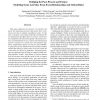246 search results - page 17 / 50 » Learning to Predict Rare Events in Event Sequences |
CVPR
2012
IEEE
11 years 10 months ago
2012
IEEE
This paper addresses the discovery of activities and learns the underlying processes that govern their occurrences over time in complex surveillance scenes. To this end, we propos...
AAAI
2011
12 years 7 months ago
2011
Coarse-to-fine approaches use sequences of increasingly fine approximations to control the complexity of inference and learning. These techniques are often used in NLP and visio...
IH
2009
Springer
14 years 2 months ago
2009
Springer
Abstract. This paper estimates the minimal length of a binary probabilistic traitor tracing code. We consider the code construction proposed by G. Tardos in 2003, with the symmetri...
WAPCV
2007
Springer
14 years 1 months ago
2007
Springer
Computational models of grounded language learning have been based on the premise that words and concepts are learned simultaneously. Given the mounting cognitive evidence for conc...
CVPR
2011
IEEE
13 years 3 months ago
2011
IEEE
Real-time unusual event detection in video stream has been a difficult challenge due to the lack of sufficient training information, volatility of the definitions for both norm...

